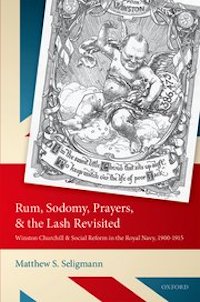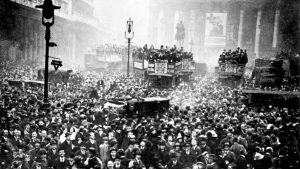Finest Hour 182
Books, Arts & Curiosities – A Modern Major Reformer

January 17, 2019
Finest Hour 182, Fall 2018
Page 44
Review by W. Mark Hamilton
Matthew S. Seligmann, Rum, Sodomy, Prayers, & the Lash Revisited: Winston Churchill and Social Reform in the Royal Navy, 1900–1915, Oxford University Press, 2018, 183 pages, £60/$78 (hardcover). ISBN 978–0198759973
W. Mark Hamilton is author of The Nation and the Navy: Methods and Organization of British Naval Propaganda, 1889–1914 (1986).
Winston Churchill as First Lord of the Admiralty from 1911 to 1915 was not the archconservative politician he is sometimes thought of as today. In fact, in the period before the First World War, Churchill was viewed by his contemporaries as a social reformer and agent for change.
Arriving at the Admiralty in October 1911, Churchill announced an interest in pursuing needed naval reforms, but the Lords of the Admiralty objected that these would violate Royal Navy traditions. “Naval tradition?” the First Lord supposedly challenged. Although Churchill denied ever having said it, a secondhand account credits him with labeling the traditions in question as “nothing but rum, sodomy, prayers, and the lash.” Historian Matthew Seligmann transforms this famous if disputed riposte into the outline for his book, examining how each of the four social issues affected the Navy and Churchill’s addressed them as First Lord. There is also an opening section on “pay, promotion, and democratization.”
Each of the social issues had a significant effect on life at sea, and Seligmann notes that Churchill’s concern for social reform in the navy had been shared by Admiral Sir John Fisher several years earlier. Both men were convinced of an impending European war and believed that the Royal Navy required both reform and strengthening to be ready.
Churchill’s greatest concern, according to Seligmann, was the status and well-being of the officers and men who made up the Royal Navy. The First Lord wanted to make life in the navy more attractive. Sailors’ pay was low and a source of widespread discontent, so Churchill worked to get higher pay for the lower deck and to develop a more diverse officer class. Naval officers who came from a privileged stratum of Edwardian society were not typically the brightest or bestsuited for their positions. Churchill was in contact with social reformers such as Lionel Yexley, editor of The Fleet, the annual naval yearbook, which urged improvements for the lower deck. The British Navy League also encouraged reforms as a result of its civilian visits to naval ships, where its representatives talked directly to sailors. Enabling faster promotion was a Churchill goal, especially because of the chronic shortage of junior officers and the need for more ships in the Anglo-German naval race.
The daily rum ration, or “grog,” dispensed in the Royal Navy became an increased concern for the Admiralty as the Temperance movement gained strength under the new Liberal government. While Churchill appeared rather indifferent to the controversy, possibly because of his own well-known enjoyment of spirits, he was pressed to address the issue. Seligmann describes the various reforms examined—including making the rum ration an option, with sailors who abstained receiving a small payment—but financial costs and Treasury opposition resulted in failure. British sailors continued to enjoy a rum ration for another fifty years; it did not end until 1970!
Sodomy, Seligmann observes, was yet another issue of concern for the First Lord and the Admiralty on the eve of the First World War. Homosexuality was a strong taboo in late Victorian and Edwardian society, as the public trial of Oscar Wilde attests. Though sodomy trial cases were uncommon in the Royal Navy, with evidence being hard to collect and personal confessions extremely rare, strong suspicion of sodomy would result in dismissal without a formal court-martial. Despite the fact that the Navy was anxious to avoid public embarrassment, the volume of “vice” cases, which included sodomy, was on the increase. Churchill, however, having many homosexual friends and associates, took a rather tolerant view of the morality issue.
The spiritual well-being of the officers and enlisted men in the Navy was another controversy faced by the Edwardian Admiralty. Only Church of England chaplains were allowed on Royal Navy vessels, much to the unhappiness of Catholic clergy and their adherents. Their objections increased the pressure on the Admiralty for non-Anglican representation.
In 1904, Admiral Fisher worked to shorten the enlistment term for Anglican chaplains in order to introduce “fresh blood” to the naval chaplaincy. Though Fisher’s plan did not work well, it was followed with limited compensation of “non-conformist” clergy and permission for sailors to attend dockside and port churches. Pressure from Irish Catholics continued to increase, and Catholic clergy ultimately served aboard naval warships when the World War commenced.
Though Churchill himself was not terribly religious—historian Andrew Roberts describes him as having had a “comfortable relationship with the Almighty”—Churchill worked hard to balance the various sides. As the grip of the Anglican church on the British Navy slowly abated, the needs of the non-Anglican and Catholic clergy were met, but complete freedom of worship aboard ship was not achieved until the Second World War.
Discipline in the Royal Navy had always been harsh before Churchill’s time. In 1911, the Royal Navy still embraced corporal punishment, especially for younger sailors, who were occasionally caned. Attitudes were changing, however. Questions were raised in Parliament about the practice, and the British Navy League and the Humanitarian League were writing letters of concern. Besides questioning the morality of the practice, many naval officers saw corporal punishment as counterproductive to discipline. Churchill, who had been sadistically caned as a schoolboy, requested an official review of the issue and added to earlier reforms, but he did not oppose corporal punishment outright, even though he was always a friend of the common sailor.
Seligmann is a recognized authority on the Anglo-German naval race and the events resulting in the 1914 Armageddon, a well-trodden subject. He is, however, the first to delve into the Edwardian Admiralty through the lens of social and cultural reform during the pre-war era. In filling a missing gap, Seligmann shows that Churchill was by Edwardian standards a social reformer as First Lord of the Admiralty. The author has delved deep into primary sources, which are carefully explained in a bibliographic essay, to create a must-read book for any scholar working on Churchill and the Admiralty on the eve of the First World War.
Subscribe
WANT MORE?
Get the Churchill Bulletin delivered to your inbox once a month.






